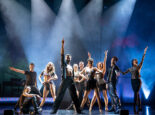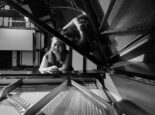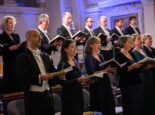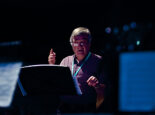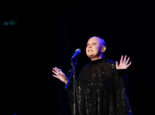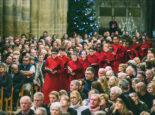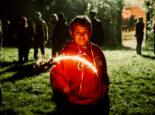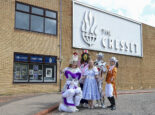Ralph McTell: ‘Nearly all my heroes were black, American, usually blind and most of them dead…’
Ralph McTell: ‘Nearly all my heroes were black, American, usually blind and most of them dead…’ 1 2
Your vocal delivery always had an amazing quality to it – something I can only describe as ‘honest’.
I think it is honest, but really I don’t know any other way of doing it. When I’ve affected the voice or tried to give it more gravitas often you shout louder and it sounds weaker. These songs came after a lot of consideration and I’m almost talking them at you. I don’t want the artifice on stage. I want people to believe I’m their mate up there, and believe that perhaps I’ve managed to crystallise thoughts they’ve already had. Every performer seeks a resonance of some sort with his audience. But if you’ve finished a song and it’s crafted properly, then it is an honest delivery that you seek. And I’m going more and more in that direction. There was a time when I wanted to be Ry Cooder or something and have that mid-Atlantic accent. The guitar styles are mostly American that I’ve absorbed, but they’ve come out in a British way. Fundamentally, a man and a guitar – especially a picked guitar, as opposed to a strummed one – has to be honest otherwise you’d see right through it, I think. There’s nowhere to hide! There’s no light show…
I’ve read you once said: ‘Nearly all my heroes were black, American, usually blind and most of them dead…’
Yep. They still are! The one exception – someone I listen to for the pure magic – is Django Reinhardt, who I never tire of. But listening to those blind, black musicians, who had no musical theory, they had a way of listening and a way of creating chords that no white musicians have been able to do – or if they have, its because they’re mimicking. If you gave some of these old guys a guitar that you’d put perfectly in tune, they’d detune it, to make it a little bit out. Modern musicians use chorus pedals to slightly detune the guitar and make it sound even bigger, but Reverend Davis – one of my heroes – always used to do that. And Joseph Spence, the Bahamian guitarist. Amd the guitar becomes bigger, the harmonies sounds stranger, the way they form their chords is different, and the guitar becomes absolutely huge. Even Dylan, in the early days, almost used to play the ‘wrong’ chords to his songs. As soon as somebody more conventional got hold of them, for example Peter, Paul and Mary’s version of Blowin’ In The Wind, it just became something quite different. That seemed to me a direct inheritance from the black music that Dylan would have been listening to – the old guys. And I never tire of listening to that music.
Is Robert Johnson a particular favourite?
I adore Robert Johnson’s music. It’s so honest, so without artifice, and with such genuine, uninhibited emotion. When my phone rings it plays Crossroads Blues and sometimes I just let it ring so I can listen to the first eight or nine bars. Anyone who thinks they play the blues – or even guitar – should listen to Robert Johnson at least once a year, the whole album, and hear how a musician can be swingin’ before he even puts a note on the guitar. If you listen to the opening of Crossroads Blues it’s like he’s counted four or five bars in his head, so when he puts the slide on the guitar for the first time it’s already beating, it’s already swinging. Although the music might appear simple, it’s truly magnificent.
Most of your musical experiences are American, so how is it that your songs come across as so quintessentially English?
I can’t write about the American experience. I’m English, and I’m affected by English writers, poets and lyricists. This is a new form of writing, really. You can probably trace it back to the 60s when people started writing their own songs, and I think it’s all part of being honest. I’ve got to write about what I know and present it in a way that isn’t alien. It’s actually difficult when I go to America because they expect me to sing English folk songs, and it’s really complicated to explain what I do! It’s actually much easier here and in Australia – and in Europe, too.
Do you think there has been a resurgence of interest in songwriting in the past few years?
I think there is, but there are not so many fingerstyle guitar players, so there’s not so much that orchestral approach to guitar playing that there was in the 60s and 70s. Also, I’m not sure about the directness of the writing. Dylan and the modern writers allowed a more oblique lyric writing to take place and the song’s meanings aren’t always clear. But I think there is a sense of wonder from young players when they see a fingerstyle player, at what the guitar can do. But there’s a culture of wanting to learn three chords and write a song straight away. Before I got on stage to play anything I probably played for five years, sweating away, hours a day, every day – out of love. But a lot of songs out there are just spankin’ the plank, really. Listen to the first Bert Jansch album, which he made when he was about 22. He’d been playing since he was about 16 before he made that, and it’s an absolute delight. You do need to study a little bit…
I understand that the first time you picked up a stringed instrument it was actually a ukelele, and that you learned the George Formby method…
I used to think so, then just before my old mum died we were talking about that and she reminded me that I was fascinated by anything with strings on. Before I got the ukelele I had a piece of wood which I’d stretched a wire over and put another wedge of wood – what I now know to be a bridge – underneath it. And I used to pluck this wire and move the wedge to get different notes. She said to me ‘What you need is a one-string fiddle’ and my grandfather – who was a First World War veteran – had made a one-string fiddle, which he dug out of the cellar. It was a broom pole, and a cigar box, and a violin bow with about three hairs on it. And I spent hours playing that bloody thing. Awful. Then I swapped my harmonica for my mate Charlie’s ukelele. Then I got a book from somewhere called The George Formby Method. When I put my fingers on it and played Swannee River and the tune came out, that was it. I was hooked. Still am!
So, what can people expect on the night in Peterborough?
I was literally sitting here before talking to you thinking about what I might play. I know I will be dipping right back. I really want to bring people into the world that I’ve travelled and why the songs have a cohesiveness, even though I might have been very young when I wrote the first ones, and I will be moving back and forth across the years. I’m hoping for the first time ever to debut a song live. I always wait until they’re recorded, which is entirely the wrong way to do it, so I’m actually going to take a chance and play a song – maybe two – on this tour that have not been recorded, just to see how that works. They’re both about anniversaries. One is about the anniversary of Dylan’s second album, Freewheelin’, the other is about the anniversary of the First World War next year. Very different. I wasn’t going to tell anybody what they were but it’s out of the bag now! Anyway… No big deal… No light show… Just a bloke with a guitar…
Ralph McTell will be appearing at the Key Theatre on Monday, 28 October at 7.30 pm, with tickets priced £20.
Ralph McTell: ‘Nearly all my heroes were black, American, usually blind and most of them dead…’ 1 2








